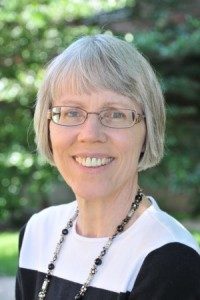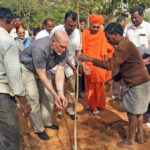By Barb Arland-Fye
Over a simple, homemade meal of zucchini soup and bread, 15 of us seated at different tables shared stories from our lives at Our Lady of the Prairie Retreat near Wheatland. After eating, everyone gathered in front of the fireplace to hear what Jim and Karen Collins and Ryan Saddler had to say about racism and white privilege and its impact on their lives.
Jim is a retired Deere & Co. executive. He and his wife are active members of Sacred Heart Cathedral in Davenport. Ryan is St. Ambrose University’s director of diversity and of the Accessibility Resource Center. I moderated the talk, the second of four weekly Lenten conversations I’ve engaged in with speakers of various faiths or ethnicities on topics they are passionate about.

The pain caused by racism surfaced immediately during the March 19 talk. Jim, who is black, described asking the parents of Karen, who is white, for her hand in marriage 54 years ago. They said, “That’s fine, but it’s either you or us because if she marries you she can’t have us,” Jim recalled.
Karen said her stepfather made that statement. Jim “was so much a different person than my stepfather.” She thought to herself, ‘“What is it I want in my future?’ Here’s what I want,” she said, pointing to her husband.
By the time Jim graduated from St. Ambrose College, the couple had been married four years and had two children. Now Karen’s parents thought they had the “nicest son-in-law anyone could have and the greatest grandchildren in the world,” Jim said. “Yet, on their dying day, I think neither one of them ever got past racism.”
Karen shared stories about meeting with teachers, on two separate occasions, regarding struggles that two of her five children were dealing with. Both teachers reassured her that she didn’t need to worry. They implied that her children were doing just fine compared with other black children.
Growing up in Waterloo, Ryan said he was oblivious to racism. He came from a close-knit extended family “who taught us the core values I still live by today — it’s faith; it’s family; it’s work, they put the work ethic in us; education, you never stop learning; and community service, give back to the community.” Family, he said, was “enough to override what was going on” regarding racism.
Ryan experienced his first painful encounter with racism as a junior in high school, driving his date to a dance in his dad’s Skylark that had been painted black and gold. “I got stopped by a police officer and all of sudden four officers were there,” he said. “Nothing negative happened. I was in shock and hurt … I was not myself for the rest of that night.”
Jim described being similarly shaken when as a young employee in Deere & Co.’s affirmative action office his car was pulled over by a swarm of police officers at the airport. They mistook him and his passenger, a white man, for bank robbery suspects who matched the description: a black man and a white man. That incident happened in the 1970s, but racial profiling continues.
A year and a half ago, Ryan and his son, then in eighth grade, were heading home from Indianola early one Sunday morning when a police officer stopped their car for no apparent reason.
Prior to that incident, Ryan had “the conversation” that black parents must have with their children because of racial profiling in America. “I got the chance to demonstrate to my son everything I told him to do,” Ryan said. As they resumed the trip back home for Sunday church service, Ryan’s son described the incident as weird and said, the officer “didn’t stop us for anything.” Ryan replied: “Son, how did I conduct myself?” His son responded, “You were very polite.”
“Who writes the playbook is really what we’re talking about,” Ryan said. “If the playbook is written from a white, Euro-male perspective, than that is the beneficiary.” He assured his white audience, “To say that (white privilege) exists doesn’t take away anything from anyone in this room.” But it’s a topic that requires further conversation.
Jim described how a group of churches of different denominations and races, called PUNCH, works together for the betterment of the neighborhood they serve. A Martin Luther King Jr. Day celebration earlier this year identified inroads that have been made in advancing people of color in leadership in corporate America. More needs to be done. “What we’re doing here tonight,” is a start, Jim said, and it’s “even better when we’re doing it one on one.”
“A recent push has been to have that conversation about race, to have that conversation about privilege. But it shouldn’t come from a person of color. It should come from someone from the majority,” Ryan said. “It has to be a place like this, a safe space and place to have a deep, authentic dialogue.”
(Editor Barb Arland-Fye can be reached at arland-fye@davenportdiocese.org.)











